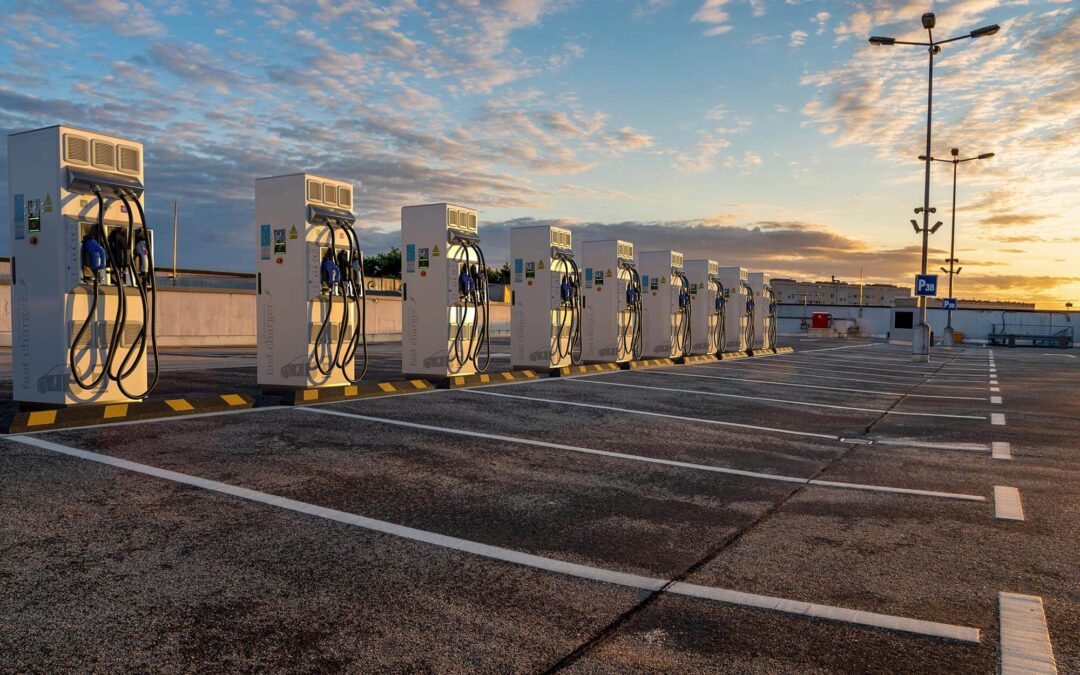As the world embraces sustainable practices, the electrification of transportation has become a pivotal focus. University campuses, often at the forefront of innovation, are recognizing the importance of integrating electric vehicle (EV) charging infrastructure. This blog explores the best practices for implementing commercial EV charging stations on university campuses and emphasizes the critical role of trusting professionals for planning and installation services.
Importance of EV Charging Infrastructure on University Campuses
Don’t be late to the party! Here’s why your university needs to implement commercial EV charging stations today:
Promoting Sustainable Transportation
University campuses are hubs of intellectual growth and innovation. Implementing EV charging infrastructure aligns with sustainability goals, promoting cleaner transportation and reducing carbon footprints. It establishes the campus as a leader in eco-friendly practices, attracting environmentally conscious students, faculty, and staff.
Meeting Stakeholder Needs
Catering to the needs of the university community is crucial. Many students and faculty members drive electric vehicles, and providing convenient charging options demonstrates a commitment to supporting their sustainable lifestyle choices. This enhances the overall satisfaction and well-being of the university community.
Best Practices for Implementing EV Charging Infrastructure
Before you begin planning an commercial EV charging station installation, be sure to check out these best practices:
Professional Planning and Assessment
Trusting professionals for planning and assessment is paramount. Engage with experienced EV infrastructure providers who can conduct a thorough analysis of the campus layout, energy requirements, and potential locations for charging stations. A comprehensive assessment ensures optimal placement, scalability, and adherence to safety standards.
Customized Solutions
Each university campus is unique, requiring a tailored approach to EV charging infrastructure. Professionals can design customized solutions that consider the campus size, traffic patterns, and energy availability. This ensures that the infrastructure seamlessly integrates with the existing environment and meets the specific needs of the university community.
Scalability and Future-Proofing
Professionals understand the importance of scalability and future-proofing. As the demand for EVs and charging infrastructure grows, it’s essential to implement systems that can expand seamlessly. Professionals can design scalable solutions that accommodate future advancements in EV technology and increasing demand for charging services.
Energy Management and Optimization
Professional planners can assess the campus’s energy capacity and design systems that optimize energy usage. Implementing smart charging solutions, such as load balancing and energy storage integration, ensures efficient and sustainable operation. This proactive approach minimizes the impact on the campus’s overall energy grid.
Regulatory Compliance and Permits
Navigating the regulatory landscape is a complex task. Trusting professionals ensures local regulations, building codes, and safety standards compliance. Professionals can handle the permitting process efficiently, reducing administrative burdens on the university and ensuring that the EV charging infrastructure meets all legal requirements.
User Experience and Accessibility
Professional planners prioritize user experience and accessibility. They can strategically place charging stations in high-traffic areas, ensuring convenience for users. Additionally, professionals consider factors like ADA compliance, ensuring the infrastructure is accessible to individuals with disabilities.
Integration With Campus Technology
Trusting professionals ensures seamless integration with campus technology infrastructure. Professionals can connect EV charging stations to campus networks, enabling features such as remote monitoring, payment processing, and data analytics. This integration enhances the overall management and efficiency of the EV charging infrastructure.
Education and Outreach Programs
Professionals can assist in developing education and outreach programs to inform the university community about the benefits of EVs and sustainable transportation. This proactive approach fosters a culture of environmental responsibility and encourages the widespread adoption of electric vehicles.
Check out our solutions at Lonestar for all your EV charging needs today.
Signs Your University Needs to Implement Commercial EV Charging Stations
If you have noticed the following trends, it’s time to implement EV charging stations at your university today:
- Increasing Demand for Electric Vehicles (EVs): A surge in EV ownership within the university community signals the need for charging infrastructure. If students, faculty, and staff are adopting electric vehicles, providing convenient charging options becomes imperative.
- Sustainability Initiatives: If your university is committed to sustainability and environmental stewardship, incorporating EV charging stations aligns with these goals. It demonstrates a tangible commitment to reducing the campus’s carbon footprint.
- Community Feedback: Regularly monitoring feedback from the university community can reveal the need for EV charging stations. If there’s a consistent request or desire for these amenities, it reflects the evolving needs and preferences of the campus population.
- Research and Innovation Focus: If your university is at the forefront of research and innovation, embracing EV charging technology reinforces this image. It positions the campus as a leader in cutting-edge, sustainable practices, attracting like-minded individuals and organizations.
- Proximity to Urban Centers: If your university is located in or near urban centers with a growing EV infrastructure, installing charging stations becomes a strategic move. It caters to the needs of those commuting to the campus with electric vehicles, promoting a seamless and sustainable transportation experience.
- Legislative and Regulatory Trends: Keeping an eye on legislative trends related to environmental policies and incentives for EV adoption is crucial. If there’s a push towards supporting electric vehicles, implementing charging stations positions the university as proactive and compliant with evolving regulations.
- Campus Expansion or Renovation: If the university is undergoing expansion or renovation projects, it presents an opportune time to integrate EV charging infrastructure into the development plans. This ensures a forward-thinking approach to the campus’s evolving transportation needs.
Partner With Lonestar Integrated Solutions to Implement Commercial EV Charging Stations at Your University
Elevate your university’s sustainability initiatives by partnering with Lonestar. We specialize in implementing cutting-edge commercial EV charging stations tailored to your campus needs. Trust our expertise for seamless planning, installation, and scalable solutions, ensuring a future-ready and eco-friendly transportation infrastructure. Join Lonestar in driving the electric revolution on your campus.

